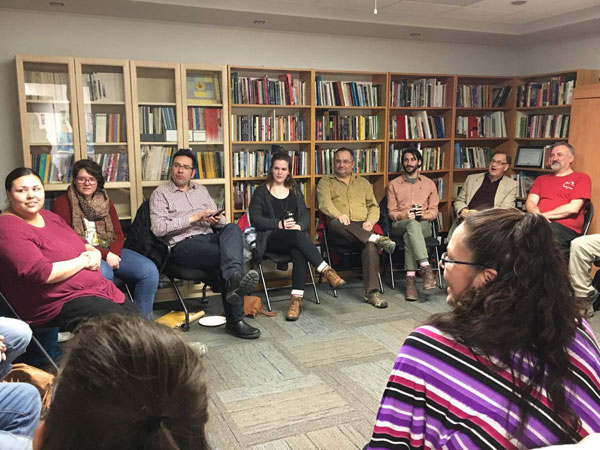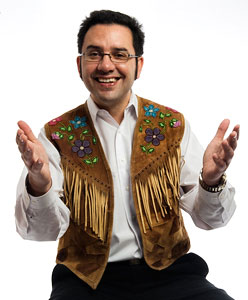Storyteller encourages using technology to its advantage
- Nickita Longman | February 12, 2017
The library at the Saskatchewan Writers’ Guild was alive with laughter one afternoon as author and storyteller Richard Van Camp facilitated a Storytellers’ workshop in Regina. As a component of Aboriginal Storytellers’ Month and funding from LSSAP, Van Camp’s visit was a compelling contribution to the events happening around the province for February.
Twenty participants sat in a circle and shared a meal together. Although the event was hosted in the SWG’s library, the atmosphere was more comparable to a gathering in the living room of a relative filled with friends.
The
casual environment diverted away from the formalities that come with
presentation with a lecture-style delivery, and instead focused on the
importance of barebone conversation that invoked memories within the
participants.
Van Camp’s first novel, The Lesser
Blessed, follows the internal thoughts of the wild imagination of Larry.
Set in the remote and fictional “Fort Simmer”, there is no doubt that the
momentum of the novel is dependent on the use of storytelling from its narrator.
Van Camp has come a long way since The Lesser Blessed, which just celebrated its 20th anniversary. He is a proud member of the Dogrib (Tlicho) Nation from Fort Smith, North West Territories, and has now written a collection of 20 books ranging from children’s stories, young adult novels, graphic comics and short stories.
So what is behind the author’s inspiration to continue to share stories? It’s something we all have and use every day: a cell phone. Van Camp recognizes the convenience of the device and its ability to capture a story through the use of photos or voice recording.
“My advice to you? Don’t wait. Record your elders. Record your family.” What if you don’t have elders around you? “Adopt elders in your community,” he says.
Van Camp holds hundreds of interviews and photographs on his phone and backs them up onto his computer faithfully.
Van Camp’s current major project and priority is none other than being a stay-at-home father to his toddler son. Aside from that, the author juggles a Writer in Residence position in the city of Edmonton, is in works with a book deal with the University of Regina Press, and is near publication of a novella on reconciliation called When We Play Our Drums They Sing.
Upon closing, Van Camp “double Dogrib dared” each participant to explore an area in their life that would be better fulfilled by exploring and seeking out more stories from family and loved ones.


